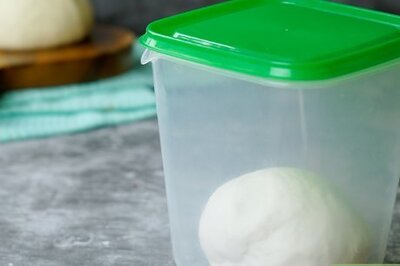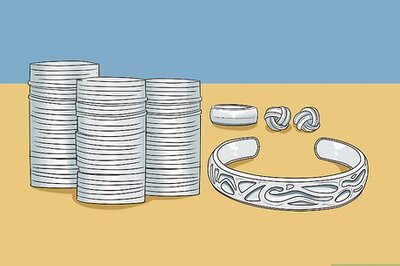
views
X
Expert Source
Payam Daneshrad, MDBoard Certified Otolaryngologist
Expert Interview. 30 September 2020.
While they might not be painful, they can grow larger and block your airways, making it harder for you to breathe and smell. There is usually no complete cure for polyps, since they tend to return if you are prone to them. You can, however, take several medical and lifestyle steps to shrink or remove polyps and reduce your risk of forming more.
Curing Polyps with Medical Intervention

Visit the doctor if you have symptoms of nasal polyps. Often, nasal polyps do not show symptoms, and you may live your whole life without knowing they are there. If polyps grow larger, however, you can experience complications that will require medical attention. If you have the following symptoms, you should visit the doctor and see if you are suffering from nasal polyps. If they test you and confirm that you have polyps, there are some medical treatments they may recommend. An excessively runny or stuffed up nose. Decreased sense of smell and taste. Pressure on the forehead or face. Feeling like your nose is clogged when mucus isn't present. Headaches. Pain in your upper row of teeth.

Use steroid sprays. Steroid sprays can help to reduce the size of your nasal polyps. If the polyps were small enough, they might disappear completely when treated with steroid sprays. Some steroid sprays are sold over the counter at pharmacies, but stronger varieties are available with a prescription. Talk to your doctor about using a steroid spray and see if it would work for you. Some of the common nasal sprays include beclomethasone, budesonide, fluticasone, mometasone, and triamcinolone. Nasonex is the most common brand name for steroid nasal sprays.

Try steroid nasal drops. Nasal drops, like nasal spray, help to shrink your polyps. Nasal drops can also clear up congestion, which can help you to breathe more easily while your polyps shrink. Most nasal drops take between 7 and 14 days to begin reducing polyps, and it is generally recommended that you continue to use them for another four to six weeks. When administering nasal drops, you should bend fully forward and downward. You should almost feel like you are about to try to stand on your head. Put the drops in your nose while your head hangs down. Keep your head down for 3 to 4 minutes after administering the drops to make sure that the drops reach your nasal cavity.

Take an oral steroid medication. Prednisone is a common oral corticosteroid that reduces swelling and inflammation. It can help treat the inflammation in your nose and thus reduce the size of your nasal polyps. You can only get this steroid through a prescription from your doctor. Normally, you would take the steroid for 7 to 10 days.

Take oral antibiotics. While antibiotics won't help reduce your polyps, they will treat complications that could result from polyps. If polyps block the sinuses, they can cause a sinus infection because the trapped bacteria will multiply. If you have a sinus infection from your polyps, your doctor will probably prescribe antibiotics to fight the infection.

Consider surgery. While these previous treatments will help shrink your polyps, usually the only way to get rid of polyps completely is with surgical removal. If polyps are persistent and causing significant discomfort, your doctor will probably suggest this option. To surgically remove nasal polyps, you will most likely have to get endoscopic sinus surgery. An endoscope—a long tube that has a light and video camera at the end—will be inserted in one of your nostrils and several tools will be used to remove your nasal polyps. You may be placed under general anesthesia during this operation. Usually you are well enough to go home the same day as your surgery. Remember that in some cases, the nasal polyps will return after two or three years.
Preventing Further Growth with Home Remedies

Control your allergies or asthma. Both of these conditions can create swelling in the sinuses, which can lead to polyps. Work with your doctor to find a treatment plan for your specific symptoms. Don't give up if you don't have great results right away—speak to your doctor about tweaking your medications until you find something that works for you.

Clear your sinuses with a saline rinse. Saline (or saltwater) rinses out irritants and allergens from your sinus passages. Use an over-the-counter saline spray or a neti pot to lower the chances that you'll develop new nasal polyps. To make your own saline solution, mix 1/2 teaspoon (3 g) of non-iodized salt and 1/2 teaspoon (3 g) of baking soda into 1 cup (240 mL) of distilled water. Always use lukewarm distilled water and not tap water, which contains irritants and contaminants. Put this mixture in a clean bulb syringe or a neti pot and rinse out your nasal passages.

Use a humidifier. Making the air in your workplace or home more humid moistens your nasal passages. This makes it easier to breathe and allows mucus to drain from your sinuses, which might prevent blockages as well as the irritation that contributes to nasal polyps. Clean your humidifier daily to prevent mold or bacteria from growing, which will further irritate your sinuses.

Try to reduce nasal irritants. Allergens and irritants in the air can create more swelling in your nose, which leads to polyps. Stay away from smoke and minimize your exposure to dust and other debris.

Eat more foods with anti-inflammatory properties. Because nasal polyps are caused by chronic inflammation, reducing that inflammation may help prevent them. Up your intake of foods with anti-inflammatory effects, including tomatoes, olive oil, green leafy vegetables (like collards, kale, and spinach), nuts (such as almonds and walnuts, fatty fish (including salmon, sardines, tuna, and mackerel), and fruits (like cherries, oranges, strawberries, and blueberries).

Avoid home remedies that aren't proven. If you look online, you're likely to find a ton of home remedies, herbs, and supplements that will supposedly cure or prevent nasal polyps. However, most of these "remedies" haven't been proved or tested. For the best results, stick with tried-and-true strategies that medical professionals recommend. Unfortunately, there's not much evidence that things like magnolia, Xanthium, or goldenseal will treat nasal polyps, and taking these supplements could be dangerous in some cases. If you want to try a natural remedy like capsaicin or tea tree oil, ask your doctor if it's safe for you and what application they recommend.
Strengthening Your Immune System to Stop Further Growth

Get plenty of sleep each night. When you allow your body to rest, it can fight off illnesses and infections much more easily than if it is overworked and tired. Be aware of your limits—while you might think that you can handle staying up all night to finish a report, know that your immune system will likely pay the price. Try to get seven or eight hours of sleep each night. Even just taking a break to nap when you’re tired can help your immune system function properly.

Eat a balanced diet. Another part of keeping your immune system healthy is making sure that you get all of the nutrients that you need. The amount of each nutrient that you need will depend on your weight, age, and health. You can talk to your doctor about a diet plan, or click here to learn more about what you should be eating. Try to fit lean protein, whole wheat carbs, unsaturated fats, non-fat dairy products, and lots of fruits and vegetables into your diet each day. Get between 500 mg and 1000 mg of vitamin C each day. Vitamin C helps to keep your immune system strong and to function. When you don’t get enough vitamin C each day, your immune system can suffer, increasing your chances of getting sick or developing an infection. Vitamin C-rich foods include oranges, lemon, guava, kiwi, strawberries, and papaya.

Exercise daily. To keep your body, including your immune system, healthy, you should try to exercise for at least 30 minutes, three to five times a week. Exercise speeds up your metabolism and boosts your immune system’s strength. Try to work in cardiovascular exercise, weight training, and flexibility workouts. Cardio includes running, hiking, biking, swimming, and walking. Strength and flexibility training includes yoga, weight lifting, and stretching.




















Comments
0 comment